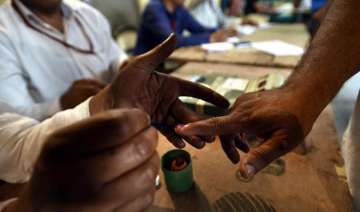Saharanpur residents feel Muslim votes crucial but won't say who they will elect
An interesting three-way contest is underway in Saharanpur, a city of 17.22 lakh voters, of which 6 lakh are Muslims.

Rameez rises early. By 7 am, he is near the popular Clock Tower in central Saharanpur, waiting for people to hire his rickshaw. The Tower area is a busy place with a diverse group of visitors, who have just enough time to amuse themselves with a discussion on politics.
Kulsoom is a final-year student at a college in the western Uttar Pradesh city. She says the discussion at her home these days is only about politics.
And Pankaj owns a grocery store on Abdul Salam Road, the epicentre of the famed handmade wooden craft of Saharanpur. He, too, interacts with people from diverse backgrounds with varied interests at his shop.
All three said they are yet unsure who to vote for this election. Or, they want to keep their decision to themselves.
An interesting three-way contest is underway in Saharanpur, a city of 17.22 lakh voters, of which 6 lakh are Muslims.
Two strong Muslim candidates - Imran Masood (Congress) and Faizul Rehman (BSP) - are into the fray against the sitting BJP lawmaker, Raghav Lakhan Pal.
The name Rameez in Urdu means "level-headed".
Standing near the Clock Tower, he said he is in a fix about who to vote for on April 11, when the Lok Sabha election will be held in the constituency.
"Imran Masood is a good leader. He should be given a chance. But I know all Harijan votes would go to Faizul Rehman and I really want BJP to lose. So I am unable to make up my mind who to vote for," Rameez said.
Saharanpur residents believe the BJP has an edge over its rivals because of a possible split in Muslim votes, a deciding factor in the city. The BJP here has historically benefited from Jat votes, which has remained largely intact behind the party over the years.
There are around three lakh SC/ST voters followed by 1.5 lakh Gujjars. Punjabis and Sikhs are around 1.45 lakh.
Kulsoom has a different set of demands. She wants a strong leader to lead Saharanpur and a university which would improve her prospects to become a teacher.
"I want a strong leader who could stand up for the rights of Muslims. But I am unable to decide who to vote for," she said. "A long, passionate discussion takes place in my home on this every evening."
She said the BJP had promised a university in Saharanpur, but it is not yet fulfilled.
There are 8 lakh female voters in the district.
Pankaj said the division of Muslim votes could favour the BJP.
"We know that SC/ST votes would shift to the mahagathbandhan candidate (Rehman) along with a percentage of Muslim votes which would be a loss for the Congress (Masood)," he said.
He did not appear very enthused with the work done by the sitting BJP lawmaker, saying the roads are damaged and wracked by potholes.
A section of people believe Masood's prospects may improve after Congress General Secretary incharge of eastern Uttar Pradesh, Priyanka Gandhi Vadra, met Bhim Army chief Chandrashekhar Azad in Meerut last month.
But the new outfit has rebuffed the Congress's overtures, saying the party has done "nothing" for Dalits during its 60-year rule.
"The Bhim Army is from Saharanpur and it is popular among Dalit youths in western UP," said Samiran, a handicraft trader.
"It would be interesting to see the poll results. There is a very good chance of Muslim votes deciding the results," he added.
Lakhan Pal said the BJP is fighting the election on the agenda of development and claimed he has support from all sections of society.
"We have focussed on development earlier and even now development would be our agenda. My wish is that no one has to migrate to other places for employment. I would start working towards it as soon as I am elected," the BJP candidate said.
Masood said the Muslim vote is an “ideological vote”.
“If Mayawati Ji is not interested in talking to Congress then she is splitting the secular votes," he said.
“We should get above politics of hatred and polarisation. My focus is providing employment to the youth, ensuring dues are paid to farmers.”
In 2014, Masood had made offensive comments against the prime minister and he was asked by the Congress to issue a public clarification.
On his comments made then, he says all that is behind him now. “Raat gaye, baat gaye.”
But at a rally in Saharanpur on Friday, Prime Minister Narendra Modi reminded the people of the district of Masood's "boti-boti" remark.
Beside the caste-religion factor, what effect does the populist schemes political parties have announced to implement if voted to power would have on the electorates?
Rameez said he earns Rs 600 per day and is content with it, but doesn't mind if a little more money coming his way.
He, however, said he does not believe the parties which have promised to transfer money directly to the bank accounts of the poor.
In his early 60s, he said he everytime voted believing these promises, not this time. "It is only during elections that parties remember the poor".
Saharanpur's political significance can be gauged from the fact that the Uttar Pradesh BJP started its election campaign this time from the constituency and Bahujan Samaj Party-Samajwadi Party-Rashtriya Lok Dal combine will hold its first joint rally in Deoband on Sunday.
The Lok Sabha constituency includes five assembly seats — Behat, Saharanpur, Saharanpur Dehat, Rampur Maniharan and Deoband.
In 2014, Pal won with a narrow margin of 65,090 votes.
Congress leader Masood came second with 4,07, 909 votes.
Jagdish Singh Rana contested from BSP and got 2,35,033 votes.